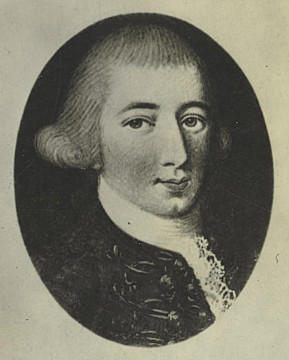Maj. Pierce Butler (1744-1822)
Planter, of Butler's Island; U.S. Founding Father & U.S. Senator from South Carolina
He was born in Ireland at Garryhundon, Co. Carlow. He came to America in 1758 as an officer in the British Army during the French and Indian War. In 1773 - a year after his marriage to the heiress Mary Middleton of South Carolina, niece of Henry Middleton, 2nd President of the Continental Congress who developed Middleton Place - he resigned his commission to become a planter. He became the owner of more than 10,000 acres and his primary holding was Butler's Island, a large rice-plantation near the Altamaha River off the southeastern coast of Georgia. In 1779, he sided with the American cause and was appointed Adjutant-General of South Carolina with the rank of Brigadier-General, but he preferred to be addressed by his British combat rank of Major.
He took an active military role in the Revolution, but by the end of the conflict many of his plantations had been destroyed, his ships burned, and the international trade on which he had relied was finished. After travelling to Europe to secure loans and establish new markets, he returned to the States in 1785 advocating reconciliation with former Loyalists and equal representation for backcountry residents. Asked to represent South Carolina at the Constitutional Convention in Philadelphia in 1787, he introduced the Fugitive Slave Clause, protecting slavery under the Constitution, and his policies led to Southern planters enjoying a disproportionate hold on power in the U.S. Congress for several decades to come. He represented South Carolina in the U.S. Senate from 1789 (when he signed the U.S. Constitution) to 1796, but his politics became increasingly inconsistent and he was regarded by his peers as "eccentric" and "an enigma". He continued to serve in the South Carolina Legislature until he lost voter confidence in 1804, and his reputation was not helped when he hosted Aaron Burr in the same year after he had been indicted for murder.
He took an active military role in the Revolution, but by the end of the conflict many of his plantations had been destroyed, his ships burned, and the international trade on which he had relied was finished. After travelling to Europe to secure loans and establish new markets, he returned to the States in 1785 advocating reconciliation with former Loyalists and equal representation for backcountry residents. Asked to represent South Carolina at the Constitutional Convention in Philadelphia in 1787, he introduced the Fugitive Slave Clause, protecting slavery under the Constitution, and his policies led to Southern planters enjoying a disproportionate hold on power in the U.S. Congress for several decades to come. He represented South Carolina in the U.S. Senate from 1789 (when he signed the U.S. Constitution) to 1796, but his politics became increasingly inconsistent and he was regarded by his peers as "eccentric" and "an enigma". He continued to serve in the South Carolina Legislature until he lost voter confidence in 1804, and his reputation was not helped when he hosted Aaron Burr in the same year after he had been indicted for murder.
He and his wife, Mary, had eight children, six of whom (listed) survived infancy. After she died, he sold off the last of their South Carolina properties and invested in his Sea Island plantations in Georgia. After retiring from politics in 1805, he lived with his family at the mansion (see images) he built on Chestnut Street in Philadelphia circa 1794, keeping a summer home, "Butler Place", off the Old York Road in Germantown. He became estranged from his daughter, Sarah, and his son, Thomas, and came to rely on his daughter, Frances, to administer to his plantations and other properties, and as such, she was duly rewarded in his will. Having successfully reorganized his businesses after the Revolution, he died a wealthy man and one of the largest slaveholders in the country. His will stipulated that Sarah's three sons could inherit part of his estate on the condition that they adopt the surname 'Butler'. The eldest son died before the will had been settled and the other two (John and Pierce) both changed their names on turning 21-years old.
His principal heir shook out to be his grandson, Pierce Mease Butler, who had married the famous British actress Fanny Kemble. Their granddaughter, Alice, married her distant cousin Sir Richard Butler 11th Bt., thereby bringing the Major's fortune back to Ireland.
His principal heir shook out to be his grandson, Pierce Mease Butler, who had married the famous British actress Fanny Kemble. Their granddaughter, Alice, married her distant cousin Sir Richard Butler 11th Bt., thereby bringing the Major's fortune back to Ireland.





